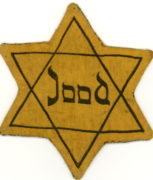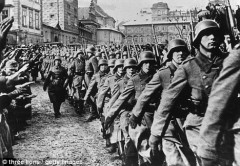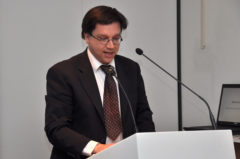The French philosopher Michel Foucault, in his The Order of Things, stated that dominant powers determine discourse and, as a consequence, what is preserved in an archive.
With this in mind, I started research into Dutch civil law notaries and their professional behavior during World War II. Their role was almost absent from historical discourse and general memory.
The only option was to dig deep into the archives to seek the truth.
In the Netherlands, anti-Jewish measures, like the spoliation of Jewish property, were instigated by order of the German occupying authorities, but carried out by the Dutch administrative and legal system.

The case I analyze here is that of Dutch civil law notaries, who formalized the resale of Jewish owned property by drafting and authenticating deeds. Dutch notaries were public functionaries appointed by the justice minister. Their professional behavior can be analyzed in detail, since the deeds and registers are kept in archives.
The notarial profession had a special position in the Dutch legal system because of the assumption that their impartiality benefited both the seller and buyer, thus providing legal security for both parties in a transaction. This distinguished a notary from a solicitor, who defended the interest of a party, and also from the judiciary which actively settled disputes.
It was the notary’s responsibility to provide legal security and secure the equality of rights. In the first half of the 20th century, the notaries’ business became increasingly dependent on transactions in the real estate markets. Impartiality had ossified into passivity. This meant that, even if a notary suspected that a transaction he was requested to formalize was wrongful, he could execute the deed and charge his fee.
The culture of passivity and failing financial supervision led to a high number of bankruptcies of notary offices in the 1920’s and 1930’s. These were treated as incidents by both the profession and the Ministry of Justice. As a result of the crisis, the financial solidity of many notaries eroded during the 1930’s. The structural problems of the ethics of the notarial profession were not recognized and, therefore, not tackled in any way.
Shortly after the German invasion on May 10, 1940, the Dutch government went into exile in London after instructing the chief civil servants in the ministries (secretaries-general) to stay and to continue their work as long as it remained within the existing laws and constitution.

On May 29, 1940, the civilian regime, led by Reichskommissar Arthur Seyss-Inquart, was installed in The Hague. The administrative apparatus directed its efforts to maintaining law and order and returning the country to ‘normalcy.’ The occupier took control over a completely operational administration.
From the summer of 1940, the German Reichskommissariat infused antisemitic regulations into the legal system. On October 22, 1940, the decree defining Jews was issued. The civil service as a whole showed the compliance that would have fateful consequences for Jews.
The Reichskommissar, on May 31, 1941, founded the VVRA, which would process all the proceeds of confiscated Jewish property. The NGV which was to take all the Jewish property in administration, was set up in 1941.
On August 8,1941, all Jews were ordered to transfer their cash to the Liro-bank, which, in fact, was a hoax — a bank controlled by the Nazis. On August 16, 1941, all property owned by Jews was ordered to be declared to the NGV. The NGV was authorized by the decree of the Reichskommissar to alienate property. The property market was to absorb the new supply of property. The demand was high, due to the economic situation caused by the war.
The transaction consisted of two phases. Firstly, the object was transferred from the administration of the NGV to a private person, usually a local broker. Next, the object was transferred to a third party: an unsuspecting buyer, but in frequently a well-informed bargain-hunter who resold the object quickly for a nice profit.
For the transfer of property to become legally effective, a notarial deed was required, as it was for the mortgage. Notaries charged a fee for the completion of transfer deeds and mortgage deeds.
To prepare the deed for resale of Jewish property, the administrative process was similar to that of a ‘normal’ transaction. The registry was checked for the legal ownership of the property. Although the property status was ‘in administration,’ the legal Jewish owners were identifiable.
The notary was completely informed. He knew whether Jewish property was at stake. The notary was present at the formal stages of the alienation process. The Jewish owner lost his property at the exact moment the notary authenticated the transaction.

It is documented that some notaries were doubtful whether they could offer their services. They approached the district courts and their professional organization, which advised them to proceed, referring to the judgment of the Supreme Court (Hooge Raad der Nederlanden) of January 12, 1942, in which the court recoiled from appraising whether the legislative acts of the German occupier were compatible with article 43 of the Hague agreements.
These stated that an occupying power in an occupied territory must restore and maintain public order and civil life, including public welfare. The Supreme Court of the Netherlands, however, relinquished its right to review. This meant that the German measures to persecute the Jews were ‘legal’ and the spoliation of Jewish property could also proceed.
In effect, the judgment legitimized collaboration. It was criticized severely by jurists during and after the war.
Many notaries profited from the new business. Since notaries were obliged to record all deeds in registers, which were transferred to the district courts of law, the data is still available.
During the post-war purge in Holland, all notaries were required to specify the transactions of Jewish property and attached mortgages. These forms provide details and insight in what notaries knew of these transaction and are the basis of my empirical research.
Interestingly, relatively few of the notaries who profited were member of the pro-Nazi NSB party. This widespread collaboration constituted a major problem. In the end, the minister of justice decided that only the NSB members could be deprived of their offices.
Tribunal cases and charges against non-NSB notaries were dismissed by the personal order of the minister, judged on their ideological conviction and punished. Those who were not NSB members but had cooperated willingly and had profited considerably could continue their office. They were fined 60 per cent of the income they had derived from the transfer of Jewish property and were allowed to deduct the repaid sum from their annual tax assessment.
The Ministry of Justice and the notaries agreed that this deal would be kept secret. The money accrued was appropriated to a Jewish and a non-Jewish charity.
Returning to Foucault’s idea, it is interesting to note that powerful institutions were successful in hiding the truth from the public for a long time. Until recently, Dutch historians, modern notaries and the public did not have a clue about the involvement of notaries in the persecution of the Jews.
But power has its limits.
In the archives, evidence of what really happened is available, and that is an encouraging observation for all truth-seekers around the world.
Raymund Schutz is an archivist at the Netherlands Red Cross World War II Archives & Research Department, where he has worked since 2001. His research on notaries was conducted under the auspices of Vrije University’s law faculty. His articles and papers are available on www.academia,edu.
RaymundSchütz, October 2013.